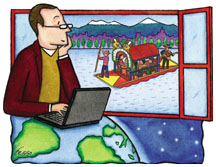
|
|
November 2, 2005: Perspective
|
(Felipe Galindo) |
Life
lessons
Sometimes the most important things are learned around the
kitchen table in another land
By Michael D. Kerlin ’97
Michael D. Kerlin ’97, a consultant in Washington, D.C., is working on a book about his experiences living with families around the world.
Ten years ago, Mexico was filled with curious conversations among strangers. “How’s it going?” one would ask. “Just weathering the crisis,” another would reply, referring to the rampant inflation, joblessness, and insecurity that followed the peso’s collapse on the eve of 1995.
Most foreigners, content to stretch their dollars farther in restaurants and hotels, were only occasional witnesses to these nervous exchanges on the street. I had a different perspective. I had taken an internship at the American Chamber of Commerce in Mexico City for the summer before my junior year at Prince-ton. My work taught me the fundamentals of the crisis, but I learned the real story as a member of the Carreño family.
The Carreños took in boarders, as a means to bring in both much-needed pesos and an international perspective. When I first arrived at their door, Señora Carmen opened it with a smile, cheerfully poking her tongue through a wide gap in her teeth. A widow for 10 years, Señora Carmen was busy catering to the needs of four boarders and her two sons, Roberto and Miguel Angel. The family had ramped up its rooming business to prepare for the day when the crisis might catch up to Roberto and Miguel Angel’s tenuous office jobs and their income would be lost.
The Carreños and I shared our best moments around their cluttered, plastic kitchen table, over tamales, quesadillas, sopes, and lots of salsa verde. We learned about each other’s cultures, and discussed our common problems — girlfriends, hangovers, long workdays.
The crisis always hung in the background, however. One night I overheard Roberto and another boarder fretting over potential layoffs at their firms. “How do you see it?” these two men, barely older than 20, asked each other, with a weariness characteristic of much older men. Roberto told me about the day he and his colleagues stood in front of television screens and watched the peso tumble to ruin in a matter of hours. “We were terrified. Some people cried,” Roberto remembered.
The Carreños were resolved not to let the crisis beat them. Señora Carmen and Miguel Angel slept on the living-room floor so that they could take in more boarders. Each week, Roberto would rush my rent payments around to different banks to find the best exchange rate. The Carreños rarely breathed easily.
Some days we indulged ourselves. One Saturday, Miguel Angel announced we would be taking a “family trip” to Xochimilco, Mexico City’s floating gardens. We piled into a tiny Volkswagen Beetle and traveled down Insurgentes Avenue to Xochimilco. In the parking lot, we untangled ourselves from the car and took in the smells of fresh corn tortillas, green tomatillos, and cilantro. We stocked up on lunch supplies, hired a flat-bottomed wooden trajinera, and set off to tour the canals. After some time, Miguel Angel hailed a floating mariachi band. The musicians tied their boat to ours and started with an upbeat cackling song, which we punctuated with high-pitched gritos, or screams; then they shifted to a slow song of love and longing.
I was grateful for the Xochimilco trip. It had created common memories for all of us, and let me witness the Carreños in an escape from the pressures of the crisis. That was the Mexico of 1995: insecure and a bit deflated, but not willing to cede its soul. The country, like the family, found ways to adapt and persist without sacrificing its lighthearted side. The bars were still full, but people drank less — or at least, they drank cheaper tequila. The markets were full, but people bought less.
We dined at home every night — it saved us money, and the food was better and the conversation freer around the kitchen table than in a restaurant.
To be sure, the Carreños were lucky. Had I lived with a family already affected by layoffs, I might have found a bleaker picture of Mexico. Instead, I found a nervous but hopeful picture. Despite working full time, Roberto planned to graduate from college on time and save enough money to visit me in the United States. (Ten years later, the Mexican economy has recovered, and Roberto is a bank executive with many U.S. stamps on his passport.)
As it was, the Carreños taught me lessons I never could have learned in a classroom. They demonstrated how Mexicans, and I, could live with uncertainty. As a type-A Princeton kid, I wanted to resolve uncertainty, not manage within it. The Carreños couldn’t bring an end to the crisis; they could only adjust and keep living — a good model for approaching many of life’s question marks and setbacks.
I left the Carreños with an enormous appetite for the insights — into a country, into myself — that are found only in the homes of local people. I was to find these insights in other international experiences: in Brazil, during senior thesis research, where I learned my best lessons about class and honesty while staying the night in a family’s cinderblock home in a shanty-town; and in Rwanda, where my Hutu hosts offered a lesson about the complexities of genocide and the power of unlikely altruism by adopting a Tutsi orphan.
Since Mexico, I have lived with families in 11 different countries,
across five continents. I feel closest to the Carreños, in part
because we shared such a critical time in their lives. Looking back after
10 years, I know it’s because it was a pivotal point in my life,
too. ![]()

